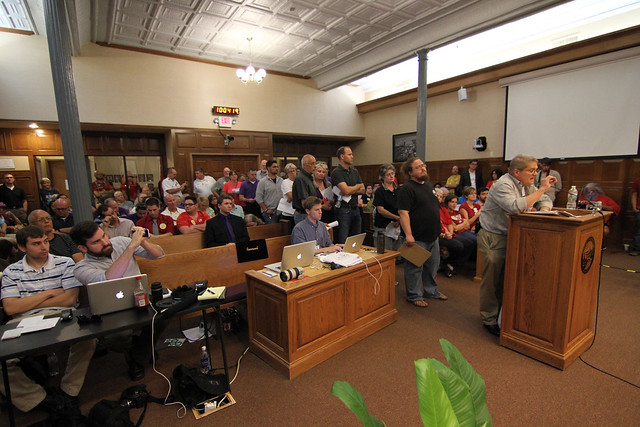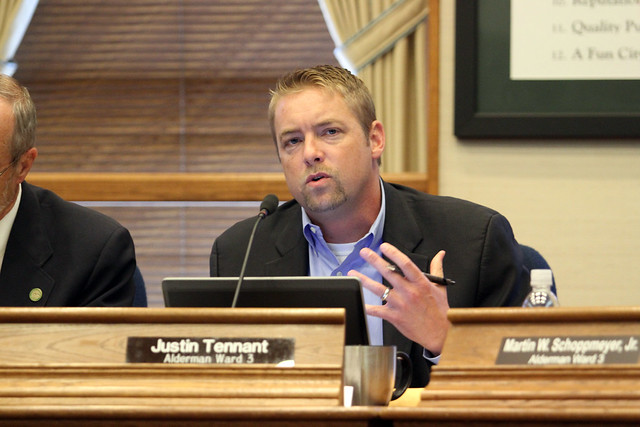Fayetteville voters will soon head back to the polls for the third time in five weeks.
Early voting for the Dec. 9 civil rights special election begins Tuesday (Dec. 2) at the Washington County Courthouse, 280 N. College Ave. in Fayetteville.
Residents who want to vote early should visit the County Clerk’s office on the third floor of the courthouse between 8 a.m. and 4:30 p.m. Tuesday through Friday and on Monday, Dec. 8.
Election day polls will be open from 7:30 a.m. to 7:30 p.m. on Tuesday, Dec. 9. Polling site information is available at www.voterview.org.
What is the civil rights ordinance (Chapter 119)?
Voters will decide the fate of Fayetteville’s new Civil Rights Administration ordinance which prohibits business owners and landlords from unjustly firing or evicting someone because of their sexual orientation, gender identity, socioeconomic background, marital status, or veteran status.
The ordinance was passed by the Fayetteville City Council on Aug. 20 after nearly 10 hours of public discussion and debate.
A group called Repeal 119 immediately began a petitioning campaign to stop the implementation of the ordinance, and eventually turned in enough signatures to put the new law on hold and force a Dec. 9 special election to decide the fate of the ordinance.
Are you “for” or “against” repeal?
It’s important for voters to understand what a “For” or “Against” votes means in a referendum election, as it’s not always simply a matter of being for or against a measure.
Petitioners were seeking repeal of the civil rights law when they collected signatures, which means a “For” vote is being used to strike down the ordinance.
If you cast a vote “For” vote, you are voting to repeal the new law, which means you are against the civil rights ordinance which was approved on Aug. 20.
If you cast an “Against” vote, you are voting against repeal, which means you support the civil rights ordinance which was approved on Aug. 20.
The City Council wanted the ballot language to be reversed, but the Washington County Election Commission and Circuit Judge Mark Lindsay sided with the petitioners.
Extra info
Fayetteville City Council members passed a new civil rights ordinance on Aug. 20, but petitioners submitted enough signatures to force a Dec. 9 special election to repeal or uphold the new law.
» Read the ordinance
» See a sample ballot
» See polling locations
Advocacy Groups
Repeal 119 – For repeal
Duncan Campbell, president
P.O. Box 10138
Fayetteville, AR 72703
» Visit repeal119.com
» Contribution report – Nov. 13
» Contribution report – Dec. 2
Keep Fayetteville Fair: Against repeal
Anne Shelley, chair
1722 N College Ave, Ste C#115
Fayetteville, AR 72701
» Visit fairfayetteville.com
» Contribution report – Nov. 17
» Contribution report – Dec. 2
Common arguments
There are several arguments both for and against the new civil rights law.
Jeremy Flanagan, a pastor at Pathway Baptist Church, said protections based on gender identity could lead to men entering women’s restrooms or dressing rooms. City Attorney Kit Williams said Arkansas laws already prohibit people from attempting to enter the wrong bathroom for any unlawful purpose and that Fayetteville’s new law does not trump state statutes.
Some people who are against the ordinance have said that discrimination is not a problem in Fayetteville, and that the city is already a fair-minded place, but nearly 20 people who spoke at the Aug. 20 City Council meeting recounted personal stories of discrimination in town. Lowell Grisham, Rector of St. Paul’s Episcopal Church, said he frequently hears from LGBT members of his church who have been discriminated against in Fayetteville.
Business owners who are against the law have said the ordinance will hurt businesses in Fayetteville and will cause other companies to think twice before moving to town. Supporters, however, have noted that many large companies, including Walmart, have anti-discrimination policies. According to research by the Williams Institute at the UCLA School of Law, 98 percent of the country’s largest companies now prohibit discrimination based on sexual orientation and nearly 85 percent prohibit discrimination based on gender identity.
Terry Turpin, co-founder of Fayetteville-based company Acumen Brands, has said the ordinance is overreaching and is a violation of state law, but City Attorney Kit Williams said civil rights are not a state affair, and that municipal governments have clear authority in Arkansas to enact ordinances like the one approved in Fayetteville.
The socioeconomic debate

The City Council chambers were at maximum capacity during the Aug. 19-20 vote to approve the ordinance.
Photo: Todd Gill, Flyer staff
One of the most pronounced debates about the new ordinance was centered around discrimination based on socioeconomic background.
Some people have said protections based on socioeconomic background would mean landlords or banks no longer have the right to request a credit check.
City Attorney Kit Williams said that’s not true. Socioeconomic “background,” he said, is different from socioeconomic “status.”
Williams said landlords and banks have legitimate reasons for needing to know if someone can afford their rent or loan payment, and that nobody would be in violation of the ordinance for using a credit check, requesting a pay stub, or otherwise asking for proof of ability to pay.
What the new law prohibits, he said, is discriminating against someone based on their long ago socioeconomic roots. In other words, someone cannot be discriminated against because they grew up in public housing even though they now have a steady job and a good credit score.
Duggar family and Chamber of Commerce oppose the law
Jim Bob and Michelle Duggar have been active in their opposition to the civil rights ordinance.
The Springdale couple, who are featured in the TV show “19 Kids and Counting,” donated at least $10,000 toward the City Council campaigns of the three most outspoken opponents of the new law. The Duggars gave $2,000 to John La Tour, and $4,000 to both Joshua Crawford and Paul Phaenuef. La Tour won the open Ward 4 seat, but Crawford and Phaneuf were defeated by incumbents Mark Kinion and Adella Gray.
Shortly before the council approved the ordinance in August, Michelle Duggar narrated a robocall sent to Fayetteville residents that claimed the law would jeopardize the safety of women and children. In the call, Duggar echoed the claims of several local pastors who said protections based on gender identity could lead to men using women’s restrooms or showers, and that the ordinance would be “opening a door” for pedophiles and sexual predators who wish to abuse people.
Officials with the Fayetteville Chamber of Commerce held a press conference in November to announce a call for repeal of the ordinance. Chamber chair Bill Bradley called the ordinance “incomplete and vague” and said it was not adopted with enough review and debate.
Mayor and University of Arkansas chancellor denounce chamber’s opposition

“We have three classes of people that are not protected by the 1964 Civil Rights Act and I think that’s wrong,” said Fayetteville Mayor Lioneld Jordan.
Photo: Todd Gill, Flyer staff
Mayor Lioneld Jordan and University of Arkansas Chancellor David Gearhart were quick to send letters calling for the chamber to rescind its board’s decision to oppose and lobby against the new law.
As ex-officio board members of the chamber, Jordan and Gearhart said they were never invited to offer an opinion on the matter, and were denied the opportunity to address the issue at all.
“Since you list me as an ex-officio member on your website, many citizens might infer that I supported this position,” said Jordan. “I do not.”
Gearhart agreed, and added that the board’s lack of transparency is out of step with Fayetteville’s character.
“The failure to include all ex-officio members in the discussion contributes to the perception that the board operated under a veil of secrecy and was opposed to any divergent views,” said Gearhart. “Such a perception undermines the ability of the board to demonstrate that it consistently functions within the best traditions of our city which embraces openness and fair play.”
Williams to serve as administrator
The ordinance also creates a civil rights administrator position to receive and investigate complaints from residents who feel they are victims of those specific types of discrimination.
Fayetteville Mayor Lioneld Jordan recently named City Attorney Kit Williams to fill that role for at least the first year.
Jordan chose Williams after city staff completed an analysis of four similar university cities (Bloomington, Indiana; Columbia, Missouri; Ames, Iowa; and Iowa City, Iowa) with civil rights ordinances whose administrators have a background in law.

Ward 3 Alderman Justin Tennant was one of two City Council members to vote against the ordinance.
Photo: Todd Gill, Flyer staff
Williams said he views the job as primarily someone who mediates, and does not plan to be an investigator. He said he’ll listen to a complaint and then immediately contact the person who is accused of discrimination to try and get the full story. He said his number one goal will be confidential mediation, since he’ll have no authority to prosecute anyone and no right to issue any fine or punishment.
Possible revisions
Aldermen Justin Tennant and Martin Schoppmeyer were the only council members to vote against the ordinance on Aug. 20.
During the meeting, Tennant said he felt it was irresponsible to enact an ordinance that left out some details and that wasn’t discussed by the council’s Ordinance Review Committee.
Supporters of the new law have argued that any changes should be made by amending the ordinance, not by throwing the law out entirely.
City Council members recently passed a resolution expressing their intent to make two amendments to the ordinance if it’s upheld by voters on Dec. 9.
The first amendment would specifically define the term “socioeconomic background” and how it differs from “socioeconomic status.” The second would remove a reference to “physical characteristic” that was supposed to have been deleted in the final draft of the ordinance before it was approved.
Other cities with civil rights ordinances
According to the Human Rights Campaign, at least 200 cities and counties across the country have passed anti-discrimination ordinances that offer protections based on sexual orientation or gender identity, including Atlanta, Boston, Chicago, Dallas, Denver, Houston, New Orleans, Kansas City, Seattle and St. Louis. Smaller cities with similar laws include Springfield, Missouri; Starkville, Mississippi; Lawrence, Kansas; and Shreveport, Louisiana.


